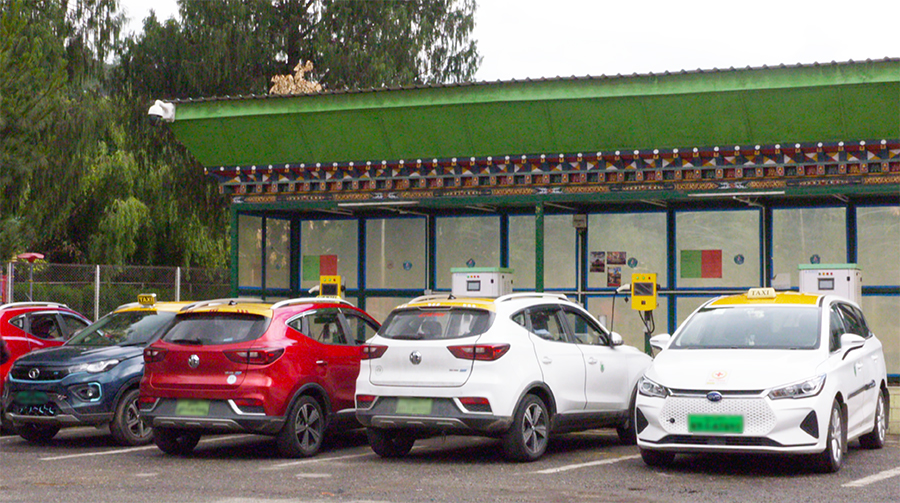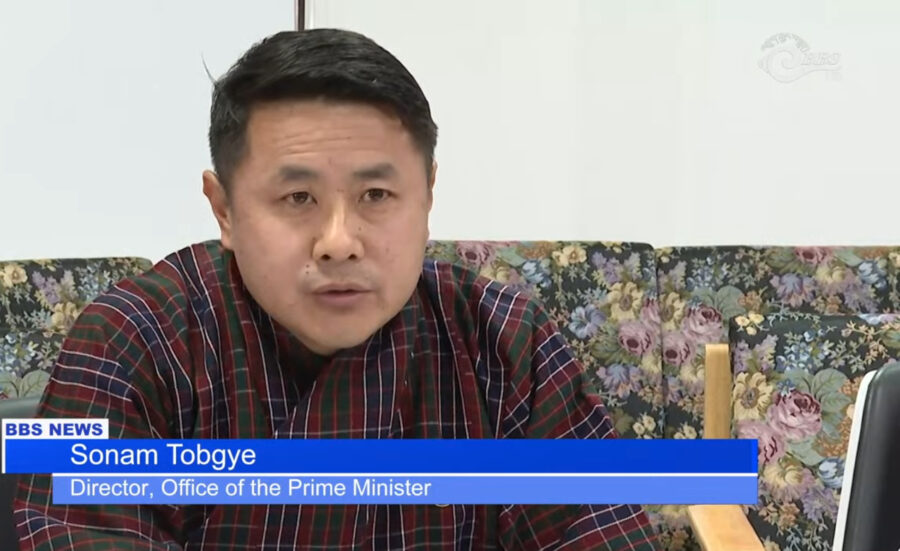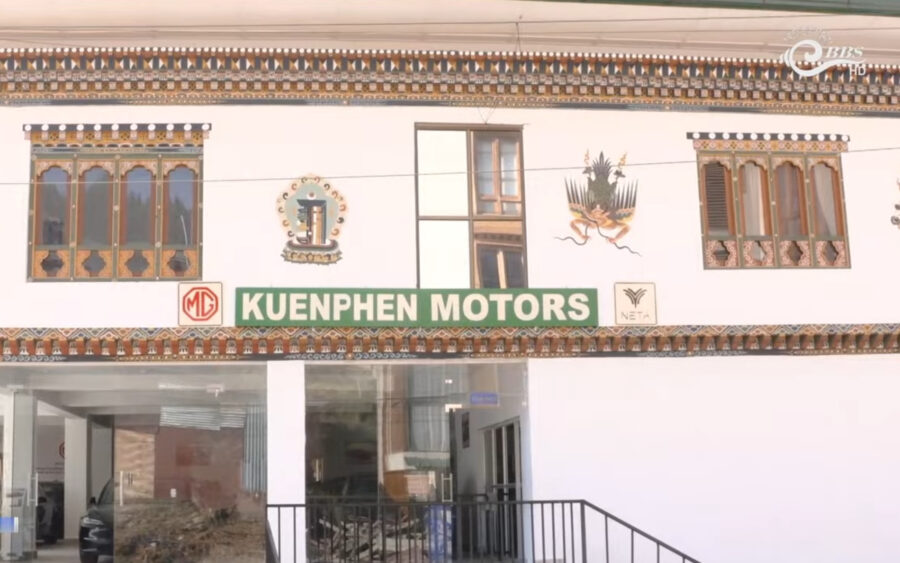 Bhutan’s electric vehicle taxi initiative has spiralled into confusion, with millions in subsidies unaccounted for and dozens of EV taxis still undelivered. Now, the Prime Minister has stepped in, ordering the Cabinet Secretariat to launch an urgent investigation into the matter. The ambitious “Sustainable Low Emission Urban Transport Systems” project targeted to replace 300 fuelled taxis with electric vehicles by 2023 with a 20 per cent subsidy for drivers.
Bhutan’s electric vehicle taxi initiative has spiralled into confusion, with millions in subsidies unaccounted for and dozens of EV taxis still undelivered. Now, the Prime Minister has stepped in, ordering the Cabinet Secretariat to launch an urgent investigation into the matter. The ambitious “Sustainable Low Emission Urban Transport Systems” project targeted to replace 300 fuelled taxis with electric vehicles by 2023 with a 20 per cent subsidy for drivers.
The project ended two years ago. But 27 fueled taxis have yet to be replaced with EVs.
Five car dealers were initially tasked with delivering EV taxis under the project. Among them, Kuenphen Motors received the highest subsidy for 195 vehicles. The vehicle dealership, however, failed to deliver 27 EVs while keeping the government’s subsidy money for over two years.
The Office of the Prime Minister had transferred the subsidy amount to Kuenphen Motors to procure electric vehicles.
However, 27 applicants never proceeded with their purchases, and Kuenphen Motors landed up keeping the subsidy funds for the past two years.
The project was initially under the Prime Minister’s Office. It was handed over to the Department of Surface Transport on 21st of March this year.
 Sonam Tobgye, Director of Office of the Prime Minister said “In 2023, the previous government, towards the end of its term, had directed to hand over the EV project to MoIT, particularly with the creation of a dedicated division, the Transport Planning and Development Division within the Department of Surface Transport. However, the formal handing over of the project seems to have been delayed although DoST continued to deliver on the EV mandates. The delay was primarily due to certain unresolved issues and the project management unit officials out of country.”
Sonam Tobgye, Director of Office of the Prime Minister said “In 2023, the previous government, towards the end of its term, had directed to hand over the EV project to MoIT, particularly with the creation of a dedicated division, the Transport Planning and Development Division within the Department of Surface Transport. However, the formal handing over of the project seems to have been delayed although DoST continued to deliver on the EV mandates. The delay was primarily due to certain unresolved issues and the project management unit officials out of country.”
The Director further added that while subsidies for all 300 EVs were issued to five different car dealers, they now need to verify the exact number of EVs that have yet to be delivered beyond the 27 currently identified.
Meanwhile, the Bhutan Taxi Association says the number of undelivered EVs could be more than 30. The association’s Executive Director said going by the number of loans disbursed by the banks, around 255 EVs would have been delivered so far.
The Bank of Bhutan had disbursed loans for 246 electric vehicles under the project. The National Pension and Provident Fund had disbursed loans for nine EVs under the project.
BBS could not determine the exact number of registered EV taxis in the country, as the Bhutan Construction and Transport Authority is still conducting a data-cleaning exercise within its electronic registration and licensing system which has caused discrepancies in the numbers.
 Meanwhile, Kuenphen Motors, stated that they never sought to withhold the subsidy funds. The dealership claims it was caught in the midst of administrative transitions and unclear communication with the project office. According to the dealership, they attempted to seek guidance from project authorities on how to return the undisbursed subsidy funds. However, with project heads frequently changing, the company did not receive any instructions.
Meanwhile, Kuenphen Motors, stated that they never sought to withhold the subsidy funds. The dealership claims it was caught in the midst of administrative transitions and unclear communication with the project office. According to the dealership, they attempted to seek guidance from project authorities on how to return the undisbursed subsidy funds. However, with project heads frequently changing, the company did not receive any instructions.
Furthermore, Kuenphen Motors explained that as part of their business sustainability strategy, they sold the EVs originally intended for taxi drivers to private individuals and offices at market price.
Gem Tshering, Public Relation Officer of Kuenphen Motors said “The problem was the vehicles were already in the country, but various challenges prevented their sale to taxi drivers. These included difficulties in grouping drivers into sets of four to meet collateral requirements and some drivers cancelling their bookings. The cars remained in the showroom for three to four months. Keeping unsold cars for extended periods was not financially viable.”
In March last year, the Department of Surface Transport issued a final reminder letter to Kuenphen Motors, instructing the dealership to reimburse the subsidy amount for the 27 undelivered EVs.
Kuenphen Motors claims the company is ready to either refund the government the subsidy money or import more EV taxis if the dealership receives bookings from taxi drivers.
Additionally, the letter also addressed Kuenphen Motors to refund EV subsidy to Kuenga Namgay, who had purchased a Citroen vehicle from Absolute EV Motors. Initially, Kuenga Namgay purchased EV from Kuenphen,but his car broke down within the warranty period, andhe decided to transfer his subsidy to Absolute EV Motors. However, Absolute EV motors never received the subsidy amount. Despite the letter from the DoST, Kuenphen Motors did not transfer his subsidy ownership. Currently, Absolute EV Motors has filed a case against Kuenga Namgay in Thimphu District Court.
For now, the Cabinet Secretariat has decided to determine the number of undelivered vehicles and investigate the reasons for the delay. A concrete course of action can be decided only after the investigation completes. The timeline for resolution remains unclear.
Samten Dolkar
Edited by Phub Gyem







